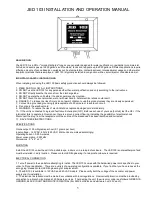
TECHNICAL INFORMATION
Page
116
Copyright
Trace Engineering Company, Inc.
5916 - 195th Street N. E.
Arlington, WA 98223
Telephone: 360/435-8826
Fax: 360/435-2229
www.traceengineering.com
SW Series Inverter/Charger
Part No. 2031-5
Rev. B: Sept 1, 1999
Load(s) - Any electrical item which draws power. (i
.
e. lights, radio, washer/dryer, refrigerator, etc.)
Locked Rotor Amps - The current drawn by an electric motor with the shaft or rotor stopped and locked
in position. This can be used to determine if an inverter has enough surge current to start a motor. If
the inverter is capable of producing more amperage than the locked rotor amps rating of a motor, it
will most likely start the motor easily.
Modified Sinewave - Also called a quasi sine wave or a modified square wave. This output looks like a
one step staircase. Most loads that will run from a sinewave will run from a modified sinewave.
However, things such as clocks and furnace controllers may have trouble. (See graph below)
Figure 36, AC Waveforms
NEC Code - National Electric Code. The guidelines and acceptable practices for electrical installations. It
is a book published every three years.
Off Grid - Not connected to public power in any way
Output Waveform- Shape of the wave that alternating current makes as its voltage rises and falls with
time.
Pass Through Current - The amount of current the inverter can safely pass directly from the AC input to
the AC output.
Plates - Originally made of lead, now fabricated from lead oxide. Plates connect to the battery terminals
and provide a structure for the chemicals that create current. There are several plates in each cell;
each insulated from the other by separators.
PV - Photovoltaic. Solar powered.
Resistance - The opposition to flow of direct current (DC)
RMS - Root Mean Square, a measure of AC voltage that would provide the equivalent heating value
across a resistor as a DC source of the same voltage.
Sellback or Selling Back To The Grid - Some inverters have the capability to take energy stored in
batteries or from solar panels and put it back into the utility grid. The Public Utility Company will then
pay you for using your energy. Check with the Public Utility Company before attempting this.
Sine Wave – An AC waveform that looks like rolling waves on water. It rises and falls smoothly with time.
The grid puts out a sine waveform. Any plug in AC equipment will operate from a sinewave output.
This is shown in Figure 36, AC Waveforms.
Square Wave - The simplest AC waveform, this is shown in Figure 36, AC Waveforms. Some types of
equipment behave strangely when run from a square wave.
Summary of Contents for SW II - REV 4.01
Page 151: ......
















































